#sycamore fig tree
Explore tagged Tumblr posts
Text
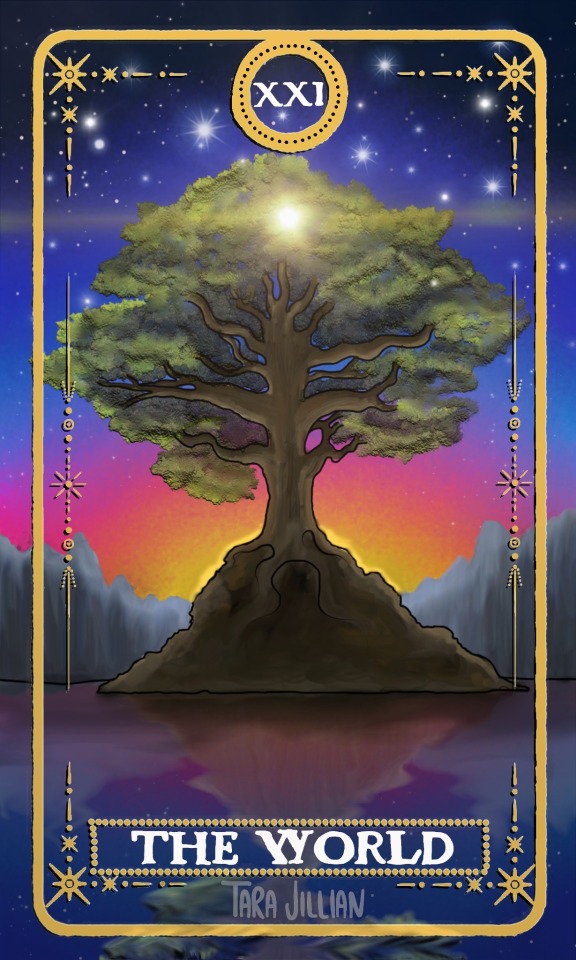
The World
The World card is the pinnacle of completion, wholeness, and the cyclical nature of existence. It celebrates the culmination of a journey, where lessons have been learned and growth has been achieved. It embodies unity, fulfillment, and the closing of a significant life chapter - the point where the inner and outer realms, the self and everything else, merge into a unified existence. In certain cultures, this experience is referred to as enlightenment or nirvana. It's the realization that our individual selves are deeply interconnected with everything else, and that we harmoniously move with the current of life, all synchronized to a shared rhythm. You not only perceive this rhythm but actively engage in it, moving along with its highs and lows, its moments of joy and sorrow.
The sycamore fig tree engages in complex partnerships with fig wasps, which pollinate the tree while laying their eggs within their fruit. The wasps' existence relies on the figs, and vice versa, creating an interdependence that mirrors this message of unity and completion. This world, like this tree, thrives when it's elements are in accord. Additionally, the World card speaks of cycles and the cyclical nature of life. The fig tree's reliance on symbiosis with fig wasps and the diverse array of animals that feed on its fruit exemplifies the card's theme of perpetual movement. This prompts us to acknowledge that life is a series of interconnected and interdependent cycles, each influenced by and influencing the next in an ever-flowing continuum.
The World / the fig tree urge us to relish and recognize the completion of each of our journeys, learning from these experiences so that we may engage with reality in a manner that won't fail to honor the profound connection of it all. Just as the fig tree flourishes through its symbiotic interactions, the card encourages us to recognize the beauty of collaboration, honor our achievements, and contribute to the concordance of all life. By gaining an understanding of life's cyclical nature, we embody the harmonious energy that the World card represents.
Prints available on Redbubble and Inprnt
| Instagram |
#artists on tumblr#illustration#tara jillian art#nature#redbubbleartist#bug tarot#tarot cards#tarot art#sycamore fig tree#fig tree#queen of trees#the world tarot#oracle#big bug gospel#bugblr
4 notes
·
View notes
Text

maybe even…home
#Katherine kcd#Katherine kcd2#kcd2#Musa of Mali#musakate#kathsa#<- as if there are enough people to name it#kingdom come deliverance 2#I hgive up. the trees have no#recognizable detail but imagine they are sycamore fig
31 notes
·
View notes
Text
https://www.twinkl.com/teaching-wiki/the-tree-of-life-in-ancient-egypt#:~:text=From%20the%20sycamore%20tree%2C%20grows,to%20the%20Tree%20of%20Life.
The Tree of Life in Ancient Egypt
In Ancient Egypt, the Tree of Life was a representation of the series of events that brought everything into existence. Learn about the significance and different interpretations of the Tree of Life across various different religions and cultures, including Ancient Egypt, with this wiki page.

0 notes
Text
altars for kemetic/egyptian gods
hi yall, another purely based in UPG, new agey post! historically, deity offerings for the ancient egyptians often took the form of art/sculpture/hymns, incense (like frankincense or myrrh), or offerings of food (especially meat and bread) and drink (wine/ale, mostly). dialogue with the gods was often facilitated through the pharaohs or funerary rites, but your average person had access to daily magic and regular temples as well.

RA
Colors: yellow, orange, red for the sun
Offerings: eye of ra, dates, figs, grapes, apricots, sunflowers, morning glories, chocolate, pastries, orange juice, honey
Crystals: sunstone, yellow/red jasper, citrine, carnelian, honey calcite, angelite, kyanite
Animals: falcon
SHU
Colors: white, blue for the air/sky
Offerings: feathers (especially ostrich), sandalwood, gardenia, anise, paper fans, cornflower
Crystals: white/clear quartz, angelite, selenite, blue calcite, fluorite, blue lace agate
Animals: lion, ostrich
TEFNUT
Colors: white, blue for water
Offerings: sea salt, reeds, shells, water, coral, water (especially dew), lotus root/flower
Crystals: blue calcite, sodalite, lapis lazuli, amethyst, larimar, ocean/blue lace agate, aquamarine
Animals: lioness
NUT
Colors: blue, black for night. white for stars
Offerings: amber, sandalwood, sycamore, moonflowers, morning glories, milk
Crystals: lapis lazuli, star jasper, azurite, obsidian, smokey quartz, black tourmaline, labradorite, sodalite, moonstone (especially black)
Animals: boar, cow, sow
GEB
Colors: green, brown for earth. black for the underworld
Offerings: grain, beans, yarrow, cinnamon, coffee, egg shells, foliage, dirt, rocks, snake shed, milk
Crystals: jasper (various types), aventurine, moss/tree agate, unakite, obsidian, jade, malachite
Animals: snake, goose, rabbit, bull
OSIRIS
Colors: green for renewal, black for death, white for rebirth
Offerings: bandages, dark chocolate, dried fruit (especially oranges or dates), dark chocolate, coffee, cedar, vetiver, bones
Crystals: lapis lazuli, moss agate, jasper (various types), malachite, obsidian, smokey quartz, pyrite, jade, howlite, star jasper (for his astral form)
Animals: heron, ram, cow
ISIS
Colors: white, grey for the moon. blue, black for the night. green for life and resurrection.
Offerings: the tyet symbol, cow horn, milk, sycamore, feathers, dried fruit (such as raisins or dates), pomegranates, nuts, pastries
Crystals: star jasper, moonstone, rose quartz, amethyst, fluorite, bloodstone, red jasper, carnelian, labradorite, aventurine
Animals: birds (especially a kite hawk or vulture), cow, cat, scorpion, sow
HORUS
Colors: blue, purple for insight and intuition. white and red for pharoahship.
Offerings: eye of horus, weaponry/iron, lotus flower/root, feathers (especially hawk or falcon), yarrow, chocolate
Crystals: malachite, aventurine, pyrite, amethyst, lapis lazuli, jasper (various), howlite, sunstone, aquamarine, labradorite, hematite
Animals: falcon
NEPHTHYS
Colors: black for darkness and funerary rites
Offerings: beer, linen, feathers (especially of a crow or vulture), bones, coffee, nuts, milk
Crystals: obsidian, smokey quartz, black moonstone (because of association with Isis), black tourmaline, red jasper, bloodstone
Animals: vulture, crow
SET
Colors: red, black for chaos and storms
Offerings: lettuce, sand, alcohol, dragon's blood, patchouli, yarrow, vetiver, charcoal, dark chocolate, black pepper
Crystals: red jasper, black tourmaline, howlite, obsidian, labradorite, sodalite, bloodstone, malachite, pyrite
Animals: the set animal (which resembles a canine, giraffe, and aardvark), donkey
THOTH
Colors: grey, blue for intuition/intelligence. white for the moon
Offerings: quill, ink, pieces of writing/books, feathers, rosemary, citrus, sage, moon water, lavender, nuts
Crystals: amethyst, lapis lazuli, malachite, moonstone, selenite, howlite, angelite, sodalite, fluorite
Animals: ibis, baboon
ANUBIS
Colors: black, grey for funerary rites/death
Offerings: bones, ash, charcoal, red/black peppercorns, marigold (associated with the dead), linen, yarrow
Crystals: hematite, obsidian, black tourmaline, howlite, jasper (various, but especially red), smokey/rutilated quartz, bloodstone
Animals: canines, especially a jackal
BASTET
Colors: white, red for pharaohship
Offerings: ointments/perfumes of most types, cedar, anything cat related, rosemary, black salt
Crystals: tiger's eye, cat's eye quartz, bloodstone, red jasper, black tourmaline, howlite, milky/smokey quartz, pyrite, carnelian
Animals: lioness, cat
SEKHMET
Colors: red for war. grey for justice
Offerings: sand (especially red), scales of justice, iron, cypress, red pepper, black salt
Crystals: bloodstone, red jasper, carnelian, garnet, ruby kyanite, jade, smokey/clear, hematite
Animals: lioness
HATHOR
Colors: pink, red for love/sexuality
Offerings: dancing, dried fruits (especially figs/dates), pomegranates, sycamore, milk, honey, pastries
Crystals: rose quartz, amethyst, citrine, carnelian, fluorite, jade, aquamarine, garnet/ruby
Animals: cow, lioness, cobra
KHONSU
Colors: white, grey for the moon. blue, black for the night.
Offerings: lavender, sage, mugwort, dried fruit, moon shaped items, moon flower, ash
Crystals: moonstone, selenite, sodalite, obsidian, black tourmaline, smokey/milky quartz, jasper (various), blue lace agate, lapis lazuli
Animals: falcon
#pagan#paganism#polytheist#witchblr#witchcraft#polytheism#witch#magic#magick#divination#kemetic#kemetism#egyptian gods#ancient egypt#egyptian mythology#deities#deity work#deity worship#deity#altars#osiris#isis goddess#horus#anubis#bastet#bast
601 notes
·
View notes
Text
planetary botanical correspondences 🌿
including plants, herbs, fruits, vegetables, trees, etc.
[☾] moon - acanthus, adder’s tongue, agave, alder, almond, aloe, banana, blue hibiscus, broccoli, cabbage, camphor, clary sage, coconut, cucumber, datura, evening primrose, grape, hazel, honeydew melon, honeysuckle, hydrangea, iris, jasmine, jojoba, juniper, kale, lavender, lemon, lotus, mangrove, mallow, moonwort, morning glory, mugwort, mushroom, myrtle, orris root, papaya, peace lily, peach, pear, potato, pumpkin, sandalwood, strawberry, sweet pea, thyme, tomato, turmeric, violet, water lily, watercress, watermelon, white rose, wild lettuce, wild pear, willow, witch hazel, ylang ylang
[⊙] sun - acacia, angelica, ash, balsam, bergamot, birch, buttercup, calamus, calendula, cedar, celandine, centaury, chamomile, cinnamon, citronella, eyebright, frankincense, galangal, gentian, ginger, heliotrope, hibiscus, hops, hyacinth, juniper, laurel, lovage, mandarin, marigold, mistletoe, oak, orange, orris root, palm, peony, pine, poinciana, poppy, rosemary, rue, saffron, st. john’s wort, sunflower, walnut
[☿] mercury - almond, beet, bladderwrack, blueberry, caraway, carrot, cassia, celery, clover, dill, endive, eucalyptus, fennel, fenugreek, feverfew, gotu kola, heather, jasmine, juniper berry, lavender, lemon, lemongrass, licorice, lily, lime, mace, mandrake, marjoram, mastic, narcissus, parsley, peppermint, pomegranate, rosemary, sandalwood, spearmint, sweet pea, valerian, wintergreen, wolfberry (goji berry), wormwood
[♀] venus - adam and eve root, apple, apricot, avocado, banana, beans, bergamot, cashew, cherry, clover, corn, daffodil, daisy, damiana, elderberry, geranium, goldenrod, hibiscus, lady’s mantle, larkspur, lavender, lemon verbena, lilac, myrtle, passion flower, passionfruit, peach, pear, pennyroyal, peppermint, plantain, plum, primrose, raspberry, rose, spearmint, strawberry, sycamore, tansy, thyme, vanilla, venus fly trap, violet, yarrow, ylang ylang
[♂] mars - acacia, allspice, basil, bay leaf, black pepper, calamus, cardamom, carrot, cassava, cayenne, chili pepper, chives, cinnamon, coriander, cranberry, cumin, dragonfruit, dragon’s blood, garlic, ginger, hawthorne, hickory, horseradish, hyacinth, leek, mango, mustard, nettle, onion, patchouli, pennyroyal, pepper, radish, red pepper, rue, thistle, tobacco, tomatillo, turmeric
[♃] jupiter - agrimony, alfalfa, alkanet, anise, asparagus, balsam, bayberry, bell pepper, betony, bergamot, blessed thistle, borage, carnation, catnip, cedar, chamomile, cinquefoil, clove, clover, copal, corn, crampbark, endive, eyebright, fig, fir, fumitory, garlic, grapefruit, honeysuckle, hops, hyssop, lavender, lemon verbena, juniper berry, maple, nutmeg, oak, poplar, raspberry, rhubarb, saffron, sage, sandalwood, shamrock, st. john’s wort, stevia, tomato, tulip, turnip
[♄] saturn - amaranth, apple, arnica, asafoetida, ash, asparagus, beet, black bean, black cherry, black poppy seed, blackgum, bluebell, comfrey, cypress, daffodil, datura, dogwood, elm, foxglove, garlic, grape, grapefruit, hellebore, hemlock, hemp, henbane, holly, horsetail, lettuce, mandrake, mullein, mushroom, myrrh, night-blooming jasmine, nightshade, oak, pansy, parsley, patchouli, petunia, pumpkin, rosemary, skullcap, snowdrop, spinach, spruce, thyme, tobacco, tomato, valerian, vetiver, willow, winter rose, wintergreen, witch hazel, wolfsbane (aconite, monkshood), yew
[♅] uranus - banana, beet, blueberry, bryony, calamus, carrot, cedar, chamomile, cinnamon, clove, coffee, eucalyptus, fennel, ginger, gingko, guarana, hemp, kava kava, lavender, lime, mango, nutmeg, orange blossom, pansy, parsley, parsnip, pokeweed, sage, skullcap, solomon’s seal, spinach, true unicorn root, valerian, violet, wintergreen
[♆] neptune - ash, asparagus, cantaloupe, celery, cucumber, datura, endive, fern, hemp, honeydew melon, honeysuckle, jasmine, lemon balm, lavender, lettuce, lilac, lobelia, lotus, melon, morning glory, moss, mugwort, myrrh, nutmeg, orange blossom, passionflower, peach, pear, pine, poppy, psilocybin, rhubarb, seaweed, skullcap, strawberry, valerian, water lily, watercress, watermelon, wild lettuce, willow, wisteria, zucchini
[♇] pluto - acacia, anise, asparagus, barley, basil, belladonna, black walnut, blueberry, buckwheat, chives, chrysanthemum, columbine, corn, cypress, damiana, dogwood, dragon’s blood, eucalyptus, fern, fig, fly agaric, foxglove, galangal root, garlic, guarana, hops, kava kava, larkspur, leek, mandrake, mullein, mushroom, nettle, oats, onion, pansy, parsley, passion flower, patchouli, periwinkle, pomegranate, potato, psilocybin, redwood, rye, saw palmetto, silverweed, skullcap, spinach, strawberry, turnip, valerian, vinca, wheat, wormwood, yohimbe, yucca
© 2025 bunny-claws
#cosmic witchcraft#cosmic witch#witchblr#witches of tumblr#witchcraft#celestial witch#celestial witchcraft#planetary magic#bunny-claws
19 notes
·
View notes
Text
Isis/Auset, Goddess of magic, motherhood and nature!
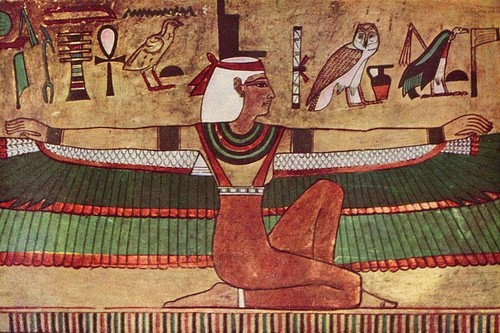
Who is Isis
Isis, or in Egyptian Auset, is the Goddess of Magic, health, marriage, nature, motherhood, fertility, purification, and womanhood. She is the eldest daughter of the Earth God Geb and Sky Goddess Nut. She is the loving wife of Osiris, sister of Nepthys and Seth, and mother of Horus.
Her magic was believed to be so powerful that she could control fate and restore health to the sick. She also has many myths surrounding her, the most notable being the Osiris myth, where she brings her husband, Osiris, back to life after he had been killed by their jealous brother Seth. Another myth she plays an important role in is the Contendings of Seth and Horus, where she assists her son Horus in taking back the throne from Seth.
Isis is a goddess with many, many aspects and domains. Along with being a beloved Goddess of the Egyptians, the Romans and Greeks loved her too, and her cult lasted well into 500 AD, when the emperor Justinian I had her priests arrested.
She is a friend to slaves, sinners, the downtrodden, the protector of people in mourning, widows, orphans, children and single mothers, and she is a patroness of Artisans, weavers, and healers. She was also thought to be the mother of the King.
Her Symbols
Throne
Tyet knot/Isis knot 𓎬
Kite bird
Scorpions
Sparrows and swallows
Cobras
Sycamore and Acacia trees
Red Jasper (symbolizing her blood)
Green scarab
The moon, lighthouses and the ocean (Roman Period)
Offerings
Tyet knot which was used to prevent miscarriage
Gardenia, jasmine, iris, blue lotus, white lily, rose, saffron
sistrums
mirrors
bloodstone, moonstone, pearls, rose quartz, lapis lazuli, aventurine, red jasper, coral, carnelian
sweet wine, pomegranate wine, water, milk
pomegranates, honey, almonds, date figs, roast duck,
frankincense and myrrh incense
perfumes
Acacia and Sycamore
Epithets
Lady of the beautiful west
Queen of Heaven
Star of the Sea
Mother of the Gods
Lover of Silence
Keeper of Secrets
Auset the sufferer/mourner (Hebrew origin)
Face of Wisdom (Hebrew Origin)
Great Lady of Magic
Lady of Joy
She who mourns
131 notes
·
View notes
Text
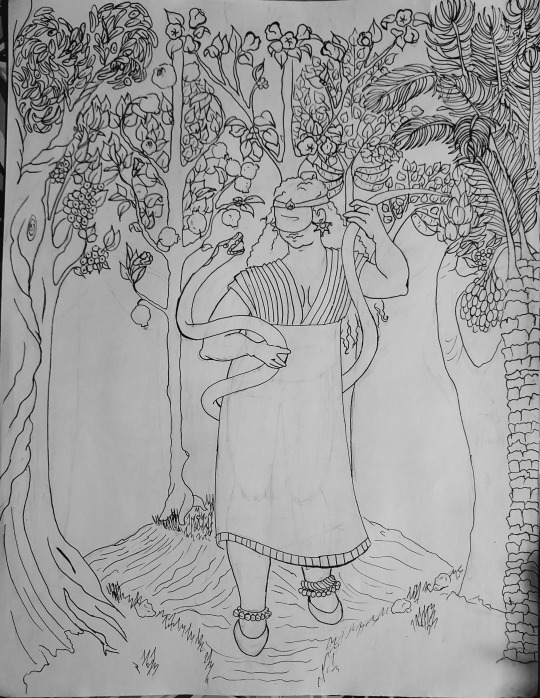
Lady Wisdom, Chokhmah. Inspired by her description in Proverbs, a brief discussion in the Hebrew Priestess, and the song Crossroads by Taya Ma
Proverbs 3:13-18; Happy is the man that findeth Wisdom, and the man that getteth understanding/For the merchandise of it is better than the merchandise of silver, and the gain thereof than fine gold./She is more precious than rubies: and all the things thou canst desire are not to be compared unto her./Length of days is in her right hand; and in her left hand riches and honour/Her ways are ways of pleasantness, and all her paths are peace/She is a tree of life to them that lay hold upon her: and happy is every one that retaineth her.
Proverbs 8:1-3; Will not wisdom call out, and understanding give forth its voice?/At the top of the heights upon the road; at the crossroads she stands./Beside the gates, at the entrance of the roof, at the entrance of the portals she cries
Proverbs 8:22-23; The Lord acquired me at the beginning of His way, before His works of old./From the distant past I was enthroned, from the beginning, of those that preceded the earth.
Proverbs 9:1-5; Wisdom has built her house; she has hewn her seven pillars/She has prepared her meat; she has mingled her wine; she has even set her table./She has sent her maidens, she calls on the wings of the heights of the city,/Whoever is simple, let him turn in here. To the one devoid of sense, she says to him,/Come, partake of my bread and drink of the wine I have mingled.
I interpreted the pillars as trees because a similar thing happens elsewhere in scripture, and there's mention of the fruits/produce of Wisdom, as well as Chokhmah being identified with the Tree of Life
The snake is here because of its connection to the Tree of Knowledge, which obviously goes alongside Wisdom. The Tree of Life and the Tree of Knowledge are also mentioned in relation and contrast to each other in Genesis
All the trees (olive, sycamore-fig, pomegranate, quince, carob, almond, date palm) are important in Judaism and bear edible produce. Some scholars believe mentions often translated as "apple" are actually quinces, and quinces enjoy decent popularity in Jewish cuisines. Sycamore-figs aren't common in the US, but they are mentioned in scripture and have been a tree of life in Ancient Egypt and modern Egyptian folklore.
25 notes
·
View notes
Text
Red Riding Hood Members
pt: red riding hood members
reminder beings will almost definitely not turn out exactly as described, and these can be edited and changed as needed.

divider credit

“ Fear makes the wolf bigger than he is “
Name: Woods , Oak , Amber , Birch , Cedar , Ginkgo , Sycamore , Fig , Tree , Branch , Stump , Spruce , Elm , Fir , Hemlock , Hickory , Larch , Pine , Maple , Leaf , Florence , Flora , Whispy
Pronouns: They/Them , It/Its , Th🌱y/Th🌱m , 🌱t/🌱ts , Th🍃y/Th🍃m , Thron/Thorns , Lea/Leaf , Leaf/Leafs , Branch/Branchs , Tree/Trees , Leaf/Leaves , Wo/Wood , Fe/Fern , Fern/Ferns , Oak/Oaks , Fig/Figs , Elm/Elms , Fir/Firs , 🌱/🌱s , 🍃/🍃s , 🍂/🍂s , 🍁/🍁s , 🪵/🪵s , 🌲/🌲s , 🌳/🌳s
Gender: Neutral , Panforest , Forestembodiment , Forestkinic , Lushforestgender , Gothforestean , Nihtforésen , Pictuforestnix
Attraction: Cenelian , Forestallion , Arborsymaffectis , Silvacrittaffectis
Other ID: Sentispace , Forestsum , Forestvesil , Forestperspesque
Species: Living Woods
Role: Beastmaster , Peacemaker
Aesthetics: Grimdark , Fairy Tale , Naturecore , Fairy Grunge
pt: name , pronouns , gender , attraction , other id, species , role , aesthetic(s)

Name: Red , Scarlet , Ruby , Rose , Rosé , Maroon , Hood , Little , Small , Darling , Dear , Apple , Amorie , Amour , Amourette , Juliette , Ophelia
Age: 19
Pronouns: She/Her , Sh♡/H♡r , Sh❤️/H❤️r , Sh♥️/H♥️r , Sh❤️🩹/H❤️🩹r , Sh🤍/H🤍r , Ae/Aer , Ae/Air , Be/Ber , Be/Bir , Ce/Cer, Ce/Cir , Adore/Adores , HeartHearts , Lov/Love , Luv/Luvs , ❤️/❤️s , ♥️/♥️s , ❤️🩹/❤️🩹s , 🤍/🤍s , 🧺/🧺s , 🥖/🥖s , 🥐/🥐s , 🍞/🍞s
Gender: Fem Colorgender , Redgender , Redthing , Redbowic , Reddressic , Heartgender , Cupiddarling , Lovecoregender , Valenic , Amacoquic , Lovething , Redstringic , Aromogender , Aniamoura , Loveblooded
Attraction: Lesbian , Mentisorffection , Lovuer
Other ID: ACuAB , Envivalen , Love Emsoul
Species: Human + Color Kin
Role: Protector , Stress Holder
Aesthetics: Grimdark , Fairy Tale , Cottagecore , Fairy Grunge

Name: Wolf , Wolverine , Archer , Bandit , Bruno , Brutus, Canine , Lycan , Hunter , Howl , Scout , Hunt , Lucine , Canis , Canidae , Lupin , Ralph , Remus , Wolfgang , Grim , Grimmwolf , Romulus , Lunar , Night , Moon
Age: 30
Pronouns: He/Him , H✦/H✦m , H☆/H☆m , H*/H*m , H🐾/H🐾m , Bite/Bites , Growl/Growls , Mutt/Mutts , Wolf/Wolfs , Howl/Howls, Cur/Curs , Grr/Grrs , Woof/Woofs , Growl/Growls , Yap/Yaps , Moon/Moons , 🐾/🐾s , 🌓/🌓s , 🌔/🌔s , 🌕/🌕s , 🌙/🌙s , 🌒/🌒s , 🌖/🌖s , 🌗/🌗s , 🌘/🌘s , 🐺/🐺s , 🥩/🥩s
Gender: TransMasc , Werehonum , Wolfmestic , Mascwerewolfic , Kyarkecin , Rendgender , Mordregender , Puolupus , Pluralwerewolf , Moonbeast , Wolflexic
Attraction: Turian , Wolfallion , Lupithestic Attraction
Other ID: ALyAB , Lupinevior , Wolfvesi , Wolf Omninoun
Species: Werewolf
Role: Persecutor , Urge Holder
Aesthetics: Grimdark , Fairy Tale , Goth , Dark Academia
pt: name , age , pronouns , gender , attraction , other id , species , role , aesthetic(s)





Tagging: @galaxy-starshine & @bahtive
#build a headmate#build an alter#alter creation#headmate creation#willogenic#build a system#🎼 mod 🎹#✦ member#✦ sentispace#ANTI RQ#ANTI RQ headmate pack
14 notes
·
View notes
Text
The Sacred Tree: Rooted in the Goddess, Reaching Toward Eternity
In the ancient world, long before steel towers and concrete roads shaped our cities, humanity turned to a different kind of architecture, the Tree. Not just any tree, but the World Tree, the Cosmic Tree, the Tree of Life, a living symbol of fertility, transformation, and the eternal rhythm of life. And at its roots, always, was She: the Great Goddess.
In the spiritual traditions that predate patriarchal religion, the Tree was not simply wood and leaves. It was a living embodiment of the Divine, connecting heaven, earth, and the underworld, three worlds united through Her branches, trunk, and roots.
The World Tree: Bridge of the Cosmos
Among Neolithic agricultural peoples and even their Paleolithic ancestors, the Tree stood as a central pillar of existence. Shamans in trance climbed the World Tree, symbolically or in spirit, to receive visions. This Tree was not just in the forest; it was seen as the human spine, the axis of the world, and the path to the heavens.
In the Goddess’s magical garden, Her Garden of Immortality, this Tree flourished, heavy with fruits and grains, watched over by a crescent moon above and a serpent coiled around the trunk below. The dove, messenger of divine love, perched in its boughs. This triad, tree, serpent, and bird, expressed the triple structure of the universe and of the human mind: the reptilian roots of instinct, the mammalian body of emotion, and the human neocortex’s vision of spirit.
This wasn’t metaphor. It was cosmology with roots.
Fig Trees and Divine Flesh
If the World Tree had a physical form, it was often the fig tree. Sacred to Hathor in Egypt, the fig was not just food; it was eternal nourishment, the “living body of Hathor on earth.”
Eating from the fig tree was not merely sustenance—it was sacrament. The fig’s red, pulpy interior echoed the womb; to eat its fruit was to partake of the Goddess herself. On Crete, women cared for these sacred trees, and seals often show the Goddess with Her attendants tending the garden. The fig was the fruit of immortality, the flesh and fluid of the Divine Mother.
These trees were seen as portals between worlds, feeding both the living and the ancestors.
Ritual and Root
Trees were not only nurtured, they were ritually cut, honored, and reborn. Priestesses alone had the right to cut the ceremonial trees, using the labrys, the double-headed axe, a symbol of life and death held in sacred balance.
Even Dionysus, born of the Goddess, was sacrificed as a tree-bound god, his flesh as bread, his blood as wine, echoing later Eucharistic themes. In a rite older than time, the harvest god died on a tree so the world could be reborn.
Conflict and Conquest: When the Tree Was Cut Down
With the rise of patriarchal systems, the Goddess’s trees became dangerous. The Bible’s prohibition against planting a tree, asherah, beside Yahweh’s altar reflects this shift. Asherah, once the Goddess of the Grove, was cast out. Her image, often carved in living wood, was destroyed. Her sacred places were razed. Trees, once places of prayer and prophecy, became symbols of rebellion.
In myth, Zeus sent Hercules to kill the serpent guarding Hera’s tree, severing the Goddess from her sacred fruit. In Genesis, Eve’s wisdom-seeking in the garden is demonized, the tree and the serpent now signs of sin, not sanctity.
The cross, a later Christian symbol, was first the mark of life, carved near the Goddess’s womb or breast. It represented birth and growth, not death and punishment. In ancient Egypt, the ankh, a looped cross, stood for life, the very essence of the Tree’s power.
Remembering the Tree, Reclaiming the Goddess
The Goddess’s Tree remains with us, even if renamed, recontextualized, or forgotten.
You see her in the fig on your table, the sycamore you rest beneath, the spiral of your spine, and the roots of dreams that travel through time. Her serpent still slithers through myth. Her bird still sings in branches. Her tree still stands, in the depths of your soul, in gardens wild and untamed, in the rituals of those who remember.
To honor the Tree is to honor the cycles of life, death, and rebirth, the rhythm of the Goddess Herself.
So plant a tree. Climb one. Dream of one. Eat of its fruit and remember.
The Tree is Hers. And She is still alive.
3 notes
·
View notes
Text
the following skirts are almost sold out!
ocean miniskirt size C ‼️only 1 left‼️

there’s only 4 left for snail midi size D, ye olde cats midi size C, red ochre mini size A, chanterelle mini size D, and dusty turquoise mini size D


5 left for chanterelle midi size B

6 left for the clouds midi in sizes C and D, and the dusty turquoise midi in D

there are 7 D size chanterelle midis, 9 A size dusty turquoise minis, 10 C size fancy rats, and 10 D size hydrangeas


13 for size D sycamore midis, size C stargayzing midis, size C desert sunset minis, and size D whale midis



other skirts that are running low (20 or less per size per design):
size A:
fig mini
chanterelle mini
size B:
luna moths midi
size C:
rainbow midi
hiss (dark) midi
ginkgo midi
ocean midi
size D:
bunnies midi
ocean mini
clouds mini
cherry tree midi
waves midi
bee mini
rainbow mini
bee midi
hiss (dark) midi
desert sunset mini
60 notes
·
View notes
Note
hello! I'm in need of a bit of identity help and from your previous posts you seem like the perfect option ^^
I'm an endfolk(aka enderman) with a love for botany, cartography, and general environmental study. I was never given a name or identity due to not being able to telepathically communicate with the others in my haunting.
something in remembrance to my home in the warped forest/mushrooms/the void/shadows sounds nice for both. thank you for you help!
[???], sem' system
heyyy anon! i hope i did your vibes justice :)

names: noctia, hazel, ivy, aspen, olive, sage, maple, briar, acacia, acacius, acer, adair, alemo, aletris, ambrosia, anara, harriet, belladonna, leif, bonsai, branch, brair, calla, coriander, elm, fig, flor, grover, hana, herb, lark, larkspur, mahogany, marlow(e), raizel, salix, senna, sycamore, tansy, meadow, glow, portal, magma, vine, nylium, crimson, shroom/mushroom, twisty, sprout, root, fungi, stride, abyss, twila, nebulon, ombra, ink(y), october, nox, noche, coal, nero/nera, rua, zero, ebony, dahlia, hadar, kage, morgana, morrigan, rhea, sable, sal, sombra
pronouns: shad/shadow/shadowself, warp/warped/warpedself, lava/lavas/lavaself, som/sombra/sombraself, vir/virid/viridself (from viridiplantae), pol/pol/pollenself, nec/nect/nectarself, bloom/blooms/bloomself, map/maps/mapself, ink/inky/inkyself, ink/inks/inkself, gra/graph/graphself, voi/void/voidself, abyss/abyss/abysself, an/lyze/analyzeself, clair/voyance/ clairvoyanceself, shade/shadows/shadowself, umbra/umbras/umbraself, dim/dims/dimself, pitch/pitches/pitchself, blight/blights/blightself, abstra/abstras/abstractself, for/fores/forestself, end/ends/endself, tele/port/teleportself, pearl/pearls/pearlself, eye/eyes/eyeself
comforts: collecting and taking care of numerous flora, read some plant books (the secret life of trees, gathering moss and from seed to seed are recommended online!), learning the basic plant diversity in your area, trying out geocaching, maybe you could map out your area or the innerworld if you have one, painting flora you see or enjoy
#mod.crows#endos do not interact#actually a system#actually systempunk#survivorsunited#did osdd#syspunk#system stuff#systempunk#system community#did system
10 notes
·
View notes
Note
Happy WBW! Does your setting have any unique in-world symbolism? Like, are roses considered romantic there, or a different flower? Is there a popular symbol for death besides a skull?
I forgot this was in my drafts! Sorry this is so late! If you have questions about why any of the symbols apply to a certain concept let me know! I might do more posts like this in future, not sure yet.
I'm going to stick to Kishetal for this one, and I'm going to keep this one on the short side (For me). I'm keeping this one to just Love and Death, Hope that's okay.
Love
The Kishite understanding of love is quite a complicated one, in that there is no singular definition of love, and as such no singular word for it. The word Pati means desire or want for, this acts as a suffix for terms relating to types of love. Broadly love can be divided into ten categories, Ulipati (Romantic love), Kipati (Maternal or Paternal love), Kurapati (The love of a pet or animal), Lupati (The love between friends, Platonic Love), Seshpati (Lust, physical love), Impati (Love of an inanimate object or place), Jalimpati (Greed), Ushpati (Love of food and drink), Irpati (Love of Beauty, "Wonder"), and Naholpati (The love of deceased person, grief).
Ulipati (Romantic Love)
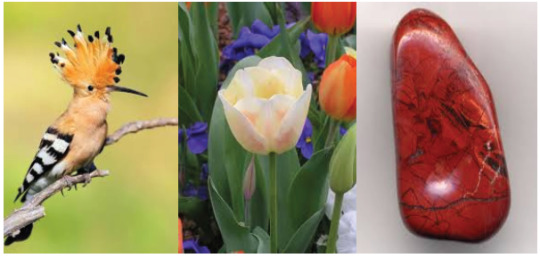
Associated Animals and Creatures: Songbirds, Hoopoes, Dragonflies, Cranes, and Doves
Associated Plants/Fruits/Vegetables: Cherry Blossoms, Lilies, Tulips, Hazelnut, Mint, and Artichokes.
Associated Colors: Purple and Dark Blue
Other Associations: The Sunset, Silk, Hoopoe feather crowns, The Heart, Coral, Jasper, and Bells.
Associated Deities: Uniki "The Great Matron"
Kipati (Maternal/Paternal Love)
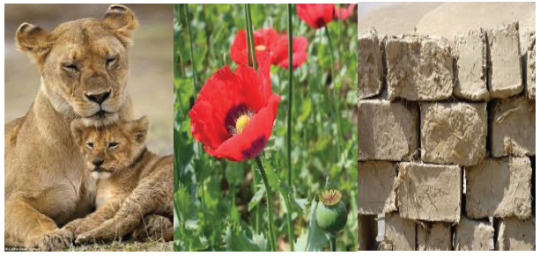
Associated Animals: Bears, Lionesses, The Durasi, Owls, and Octopi.
Associated Plants/Fruits/Vegetables: Barley, Opium Poppy, Dates, Sesame seeds, Fir cones, and Olives and Olive Trees
Associated Colors: Orange, Brown, "Earthy colors"
Other Associations: Mud, Mudbrick, Kipsha (Barley cakes), Date syrup, Eggshells, Bird nests, The Stomach, and Owl feathers.
Associated Deities: Olhasuma "Goddess of the Life Giving Sky, Giver of Fertile Rains", Jalpaha "The Great Father"
Kurapati (Love of a Pet or Animal)
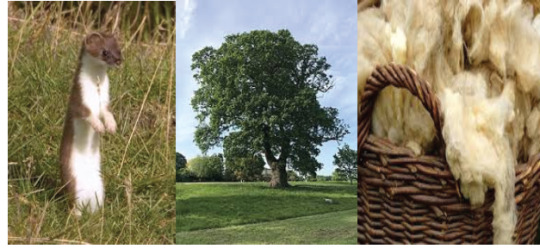
Associated Animals: Dogs, Cats, Cattle, Weasels, Sheep, Horned-Rabbits, and Mice.
Associated Plants/Fruits/Vegetables: Carnations, Oak Trees, Acorns, Oats, the Black Pine, and Thistles.
Associated Colors: Green
Other Associations: Collars, Shepherd's crook, Wool, Boar Tusks, and Leopard Skin.
Associated Deities: Unlakachi "The Wild God/ The Howling Lord", Jaramuha "The Horned God, God of the Shepherd"
Lupati (The Love Between Friends, Platonic Love)
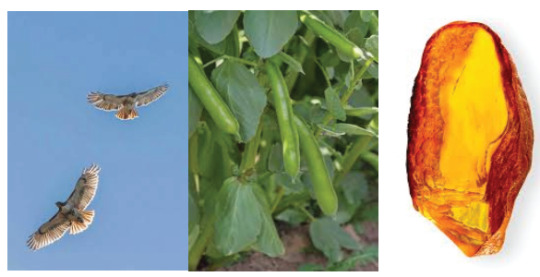
Associated Animals/ Creatures: Wolves, Deer, Ibex, Hawks, and Taruni
Associated Plants/Fruits/Vegetables: Walnuts, Poplars, Roses, Beans, Onions, and Garlic.
Associated Colors: Yellow and Blue
Other Associations: Ships, Shields, Ladders, the Sun, Wrestling, Foot races, Amber, The Liver, The Throat, and Bow and Quiver (Not arrows)
Associated Deities: Fepaha "The Drunken God", Jalri "The Great Sun"
Seshpati (Lust, Physical Love)
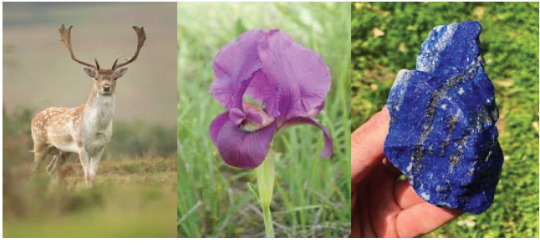
Associated Animals: Giant Minks, Oysters, Peacocks, Stags, Donkeys, Goats, and Serpents
Associated Plants/Fruits/Vegetables: Asparagus, Cumin, Irises, Sycamore, Figs, Fennel, Lisjir, Cherries, Sweetgum,Pomegranates, and Lotuses
Associated Colors: Light Green and Pink
Other Associations: Honey, Spears, Perfume, Lapis Lazuli, Phalluses, Breasts, Lips, Flutes, Dancing, and Drums.
Associated Deities: Shibachi "The Pleasure Giver", Jaramuha "The Horned God"
Impati (Love of an Inanimate Object or Place)
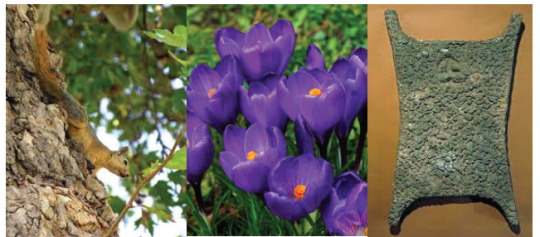
Associated Animals: Spiders, Rodents, Dragons (Tulininya), and Corvids.
Associated Plants/Fruits/Vegetables: Chickpeas, Crocuses, Fumewart, Rosemary, Sage, Reeds, and Almonds
Associated Colors: Silver and Orange
Other Associations: Houses, Lyres, Bread, Fire, Hearths, the Oxhide ingot, Needles, Linen, Bronze, Iron, Anvils, The Arms, and "House spirits"
Associated Deities: Girmaha "God of Golden Fields", Hasunku "The God of the Flaming Stone", Kimaba "Goddess of the Oven"
Jalimpata (Greed)
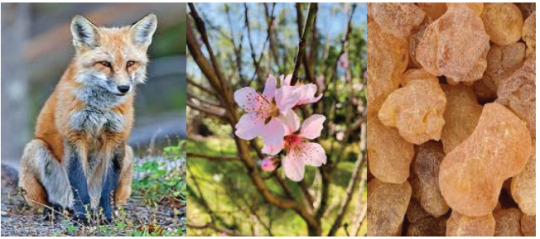
Associated Animals: Hermit Crabs, Kiriki, Foxes, and Bisku
Associated Plants/Fruits/Vegetables: Saffron, Cinnamon, Peaches, Lentils, Heliotropes, Rice, and Pistachios
Associated Colors: Gold, Red, and Yellow
Other Associations: Gold, Ostrich Feathers, Frankincense, Pearls, Salt, Ivory, Silk, Apuna, The Eye, and Rakashim
Associated Deities: Ikeshpaha "The Golden God"
Ushpati (Love of Food and Drink)
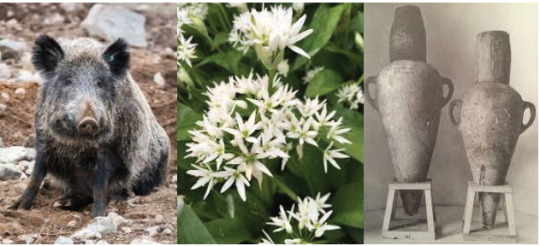
Associated Animals: Pigs, Boars, Ducks, Bees, Fish, Seagulls, Frogs, Sheep, Wild Game, Snails, and Lamalaru.
Associated Plants/Fruits/Vegetables: Apples, Figs, Carrots, Beets, Mushrooms, Garlic Flowers, Parsely, Juniper, Grapes, and Violets
Associated Colors: Red, Yellow, and Purple
Other Associations: Beer, Wine, Food (Duh), Pans, Cups, Amphora, The Stomach, The Hand and Fingers, and The Mouth.
Associated Deities: Kimaba "Goddess of the Oven", Fepaha "The Drunken God", Jalchibiku "God of the Vast Waters"
Irpati (Love of Beauty, Wonder)
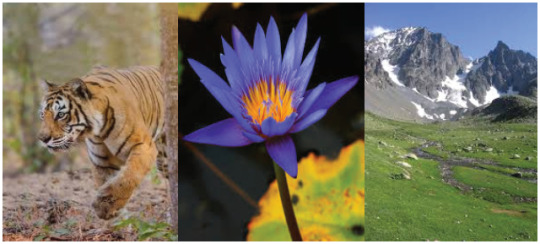
Associated Animals and Creatures: Spirits, Disuruku, Tigers, Falcons, Tiamawa, Parrots, Oceanic Fish, Whales, Butterflies, Lizards, and Exotic Bird Species (Mostly from the east and south)
Associated Plants/Fruits/Vegetables: Hasir Flower, Cypress Tree, Apunian Lotus, Cornflowers, Palm Trees, Cedar, Regalu, Botagalu, and Ivy
Associated Colors: Blue, Orange, and Most Bright Colors
Other Associations: Magic, Ruins, Art, Marble, Gemstones, The Moon, Virginity, Clouds, Birds, Ice, Snow, Mountains, and Giants.
Associated Deities: Sonma "The Dream Giver", Silima "Goddess of the Roaring Snow", Humbalima "The Stonebreaker"
Nahulpati (Love of the Dead, Grief)
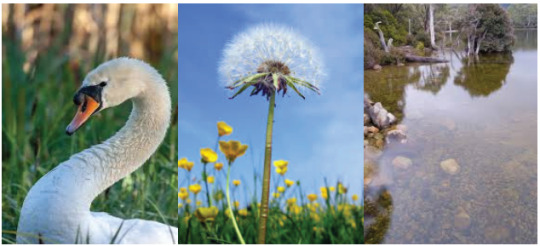
Associated Animals: Swans, Dogs, Vultures, Foxes, Jackals, Hyenas, Crows, Boruku, Crabs, and Dolphins.
Associated Plants/Fruits/Vegetables: Jasmine, Dried Flowers, Myrrh, Gladiolus, Grasses, Dandelions, and Clover
Associated Colors: White, Black, and Green
Other Associations: Burial Stones, Skeletons, The Elderly, Hills (not mountains), Singing, Mirrors, Calm Water, and Time
Associated Deities: Nahulpaha "The Judge", Shashuma "The Great Scribe"
Death
Death is a complicated topic in Kishite culture, and ultimately can be divided among its two patron deities, Nahulpaha and Dualik. I wil address the differences between each of these aspects of death and their symbolism.
Nahulpaha (Nahul= Death, Paha= Father/Dad)
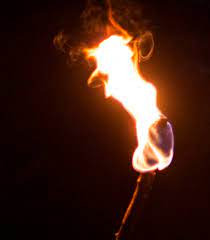
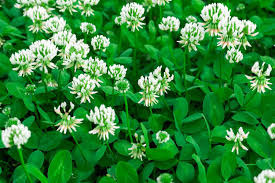
An important aspect of the Kishite understanding of death, its inherent impermanence. Nothing that dies, will stay dead. All living things reincarnate; mortals, animals, plants, and even some non-living items like mountains, forests, houses, and ships. The only difference being that mortals, those who are among The Awakened, have the potential to eventually, after many mortal lives, enter the Divine Realm, something that Animals, Plants, and even Spirits, cannot do. The Cycle defines the boundary between spirit and mortal; where the former exists exclusively as a spiritual being with an indefinite and/or malleable form, the latter exists as a soul inhabiting a defined, physical body. When a mortal body dies, the soul receives judgment, a process by which they decide if they should be reborn again on the same world, or continue on to be reborn in the next, each life coming closer to divinity. if reborn on the same world, the soul will not be burdened with the memory of the rejected life; while they are reborn as a clean slate in each new mortal world, and again into the spirit realm, if they reach the realm of the gods, they regain the memories of all of their satisfactory lives and attain the capacity to all of those people at once. A life may be rejected for any number of reasons: most commonly, the soul was too young to move on in the cycle, the soul was not satisfied or happy with that life, or the soul believes they did more harm than good during that life.
There is no concept of ghosts or the undead in Kishite folklore, however it is possible for souls that reject judgment to become trapped between lives, there they may attack or threaten the souls of the dead on their journey to judgment. There are a number of rituals and ceremonies meant to counteract this threat.
It is the duty of the deity, Nahulpaha, to guide the dead soul, to help them with judgment, to act as a mediator between the different aspects of the self. While called the Judge, Nahulpaha does not actually provide a sentence. It is thought to be impossible to lie to Naholpaha, as the god knows the mind of the soul.
The god is typically depicted as a dark or cloaked figure, who carries in his hand a torch, some say that this torch is some small piece of the sun given to him by the other gods. This may lead to a false impression by outsiders that Nahulpaha is meant to be a scary or wicked figure. However in the Kishite understanding he is quite the opposite. Nahulpaha is shown as kind, he comforts the dead so that they may judge themselves without fear or anger, he guides the souls to their next life, he sings and dances to comfort the lost children, he howls to welcome the faithful hounds, he pounds the drums to invigorate the fallen soldiers, and it is he who weaves the blankets for the worn mothers. Though he is initially believed to appear in his shadowy form, it is believed that he takes the form of the soul he is addressing, thus to speak with Nahulpaha is to speak with oneself.
Though it is his duty to usher mortal souls to the Divine Realm, he is alone among the gods in that he may not enter there. This arrangement is his choice, one made when mortal souls were first created. It is not unusual for the dead to be placed in their burial stones with food and drink, not for themselves but as gifts for Nahulpaha.
Symbols
Dogs
Foxes
Crows
Cloves
Dried Flowers
Burial Stones/Cairns
Dandelions
A Torch
A Black Cloak
Mirrors
Dualik (The Destruction, The etymology of the name dates back to before the age of the Calamity, preceeding the Kishite Language by thousands of years)
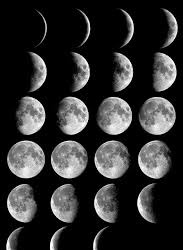
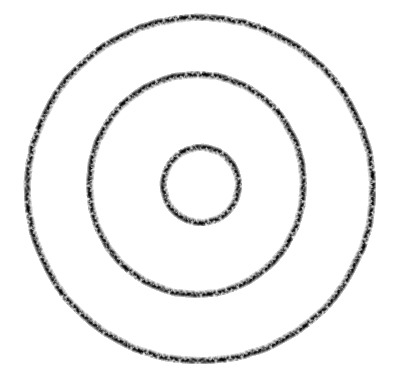
Dualik (Destruction and Time) is one of the three Primordial Beings, alongside Shobiash (The River of Creation) and Shuam (Law). They are the eternal embodiment of time and of destruction, the ferryman of the Shobiash. Both Dualik and Shuam are believed to be born of the river and the primordial nothing. It is the role of Dualik to destroy the universe at its proper time, known as the Nalbani, and to subsequently usher in the birth of a new universe. Dualik has very little to do with mortals or with the events of Kobani, and is thought of as either indifferent to or ignorant of the struggles and fates of the worlds that they oversee. This does not mean that "The Destruction'' is evil, rather it is viewed as a necessary mechanism of reality, one which all beings must heed, though one that few if any will ever see face to face.
And though Dualik is seen as time, decay, and errosion, they are also responsible for rebirth and recreation on a cosmic level. Only Dualik knows when it is the proper time for the universe to be brought to its end, and when the next should be created.
Dualik is rarely referred to in myth or ritual, when they do appear they are depicted as a many armed figure atop a barge or as 3 black circles each inside of each other.
Symbols
A Ferry Boat
Three Circles
A Many Armed Figure
The Tide
The Cycle of the Moon
13 notes
·
View notes
Text
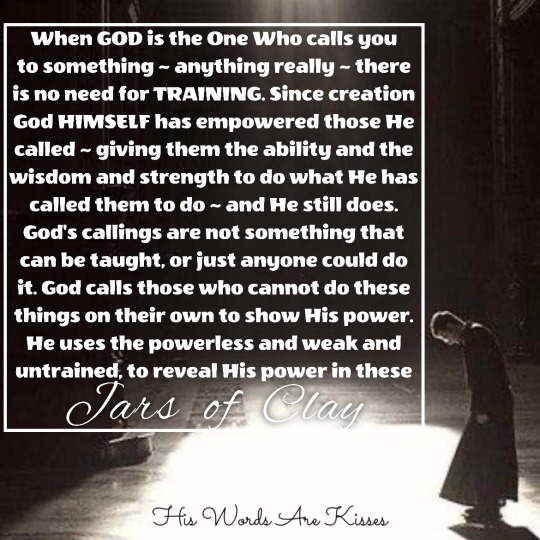
“What does it take to be used by God in a special way? Read the prophet Amos’s description of his background: “I was neither a prophet nor a prophet’s son, but I was a shepherd, and I also took care of sycamore-fig trees. But the Lord took me from tending the flock and said to me, ‘Go, prophesy to my people Israel'” (7:14-15).
Amos was a plain country boy engaged in country work, gathering figs and following the flocks. In spite of his humble background, God had a job for Amos to do. And when God told Amos what it was, he got right at it. He didn’t waste time complaining about his lack of training in the art of prophesying. He trusted the Lord to give him the ability and wisdom he needed for the task.”
~ Leroy Eims
“But we have this treasure in jars of clay, to show that the surpassing power belongs to God and not to us.” 2ndCorinthians 4:7
“But God chose what is foolish in the world to shame the wise; God chose what is weak in the world to shame the strong; God chose what is low and despised in the world, even things that are not, to bring to nothing things that are, so that no human being might boast in the presence of God. And because of him you are in Christ Jesus, who became to us wisdom from God, righteousness and sanctification and redemption, so that, as it is written, “Let the one who boasts, boast in the Lord.”” 1stCorinthians 1:27-31
11 notes
·
View notes
Text
All That Glitters is Not Gold
Chapter Ten: Pick Your Poison
The escarpment seemed to extend forth for miles on end, and Octavius wondered as to when they would get there. He hoped it would be soon as every gust of wind right then billowed a thick cloud of dust and sand over their heads. From that alone, the very first day on the trail seemed to drag on, and more so when the sun hung low over the desert sands off to their left. If there was any reassurance whatsoever, it was that the river meandered alongside them. Every so often, Octavius caught views of vast fields containing wheat, barley, and lentils all along the river banks, and every so often, he spotted the backs of the crocodiles and the hippos down in the water: as long as they kept their distance, they would coexist with them.
Indeed, when night began to fall, they were met with groves of sycamore and fig trees; there came a point in which he reached up and picked a pair of figs from a low branch next to their caravan. He handed one over to Ahkmenrah.
“Oh, thank you,” he said. “We have plenty to eat, but sometimes all we need is something as fresh as possible.”
“Couldn’t agree more,” Octavius said in a soft voice. All the while, he flashed back on the time he and Jedediah fed one another figs and pomegranate seeds. It felt so long ago, but it also didn’t.
The two of them ate their figs and watched the sunset in silence, that is until the pharaoh cleared his throat.
“You have these little plumes of gray peppered all around your head,” Ahkmenrah observed, and he lightly touched the left side of Octavius’ head.
“Indeed, I do,” he said with a run of his hand over the crown of his head. “Such is being the general and being in a powerful position.”
“I never went gray, though,” Ahkmenrah pointed out with a furrowing of his brow. “Even at my family’s worst, I never sprouted one.”
“Any secrets?” Octavius asked, nonplussed.
“Relax and… don’t fall in love, especially with someone who will break you,” Ahkmenrah replied in a small voice. “Harsh as that is, and I apologize in advance.”
Octavius sighed through his nose at the sound of that, and he raised his gaze over to the horizon on the left. The sky was painted bright orange and pink, and he knew that they had to stop at some point and give the camels a break after all of that trekking about.
Indeed, with the light of their lanterns, the Bedouins offered to help them set up camp, complete with a roaring fire and a pair of bunks surrounded by netting to protect them from mosquitoes and scorpions. Octavius knew they had posted up on the river banks, but he hadn’t a clue as to how close they were to the water’s edge.
He took his spot on a makeshift bench of driftwood next to the fire: all the while, he kept his back towards the river. Ahkmenrah meanwhile sat down to his left with a ceramic jug and a pair of white glasses in his hands.
“Care for some wine?” Ahkmenrah offered him.
“I would love some wine,” Octavius replied with a run of his fingers through his hair. “Especially after a day out in the desert like we have.”
Ahkmenrah pried the cap off and poured them a glass each, and the unmistakable aroma of yeast as well as some earthy spices flooded the air all around them.
“Oh, my goodness, that is potent, I can tell,” Octavius remarked as he took the first glass in Ahkmenrah’s hand.
“It’s got nothing on you guys and your mulling, but it’s the pride of the Nile, though.” The pharaoh raised his glass to him for a toast, and they clinked the edges together. They drank it down in unison: the yeast hit Octavius right between the eyes, but the taste of the grapes caressed his tongue and quenched his thirst.
“Wow, that is—” He put his head down and cleared his throat.
“It’ll put some hair on your chest,” Ahkmenrah said with a smirk: with that, Octavius lifted up his collar and looked down inside of his tunic, such that Ahkmenrah snickered at that.
“When we get there, I should probably tell you that you should put your armor back on,” he advised him.
“It would make perfect sense after all,” Octavius said with a shrug of his shoulders. He held onto the cup with both hands as he took another drink. “I remember that army of the dead that your brother inflicted onto all of us.”
“That was nothing,” Ahkmenrah promised him. “Really, that was only a fraction of it all. There’s that plus the agony he inflicted upon our parents as well as the rest of our family. To make matters worse, he is… completely blind to his own actions.”
He sipped on his wine some more and they watched the flames flicker about before them in silence: the Bedouins had turned in for the night but the camels still shuffled about on the sands behind them. It was rather jarring to feel the heat from the fire on their faces and the cool of the riverbed on their backs: the dance of hot and cold, much like the union between Octavius and Jedediah.
“You definitely miss him, don’t you,” Ahkmenrah said in a soft voice, but Octavius shook his head.
“Not when I am here, no,” he assured him. “I would rather be alone with my own thoughts for the time being.” He gazed up into the inky black sky over their heads. The stars resembled to glitter as they poked their heads out for the night: Octavius made out the shape of a pattern which appeared to be the Northern Cross up over the horizon. Somewhere below that constellation was Rome itself. They would be home soon enough: he would be home.
“His obsession with his own gold and his own goods really does feel like something of a stake in the heart,” he confessed in a single breath. “Being out here helps a great deal, however. As much as the sand hurts, as hot as it is… this was a good plan.”
“During the thick of my family’s fighting, I found solace in roaming about the place,” Ahkmenrah told him. “Both in sticking my head into books as well as traveling to places.”
“Like Britain, for example?” Octavius glanced back at him with a smirk on his face.
“Like Britain, oh by the way,” Ahkmenrah echoed in a singsong voice.
“Maybe I should have a go at the maiden in scarlet,” he suggested, and he downed the rest of the wine in one fell swoop. He pinched his eyes shut and rigorously shook his head, much to Ahkmenrah’s amusement. “It’s not that funny,” he scoffed.
“There’s just one problem,” Ahkmenrah started again, his expression serious once again.
“What’s that?”
“She is much larger than you,” he pointed out. “How in the world would you court her?”
“Good question,” Octavius said, and he paused right in his tracks. “I ask myself how did I court Jedediah.”
“How did you do that?”
The two men looked on at one another in silence, silence save for the crackling of the fire and the shuffling of the camels behind them.
“I don’t really remember,” Octavius confessed. “Golden hair and peacock blue eyes do not exist in Rome. The sole time I found myself in the northern territories, away from the Mediterranean and away from the peninsula, I met all manner of people who looked like him, and I did find myself enamored with some of them as I did with him. When I think back, my memory is rather foggy. But the maiden in scarlet, though… she’s—she’s special. The body of Venus with her prowess as well.”
Ahkmenrah downed the rest of his glass as well, and then he lifted up the jug once again.
“Wine?”
“Please.” Octavius raised his cup for a second helping of the rich Egyptian wine. He took a big swig with his eyes closed, and Ahkmenrah followed suit as well.
“What kind of creatures are around here?” Octavius asked him. “I do know about the hippos and the crocodiles. You know, I saw them at points on the way here.”
“Snakes,” Ahkmenrah replied with a straight face. “Particularly deadly ones like the black mamba, all manner of Saharan vipers, and two kinds of cobras. One you should watch out for is the red spitting cobra.”
“Spitting?” Octavius raised a single eyebrow and wrinkled his nose at that, and Ahkmenrah nodded.
“The number of farmers who die from that one in particular,” he noted. “The snake raises its head and then opens its mouth, and spits it out onto their bodies. It’s incredibly sticky, too, so not even washing it in the river waters will rid of it.”
“God’s truth…” Octavius straightened out his spine and shuddered at the thought of being covered and potentially suffocated by sticky, lethal venom.
“The black mamba is particularly nefarious as well,” Ahkmenrah continued. “Thin white snake with a black mouth. Aggressive when cornered. You don’t have to worry about them in this particular region of the Nile.”
“Still of concern, however…” Octavius’ voice trailed off, and he took another big swig of his wine. He then took a glimpse over his shoulder to the cool river banks behind him. He had no idea as to how close they were to the water’s edge, but when he looked out there, he was only met with the darkness of the night right behind him.
“God Almighty,” Octavius breathed out.
“What’s wrong?”
“It is blacker than the blackest night I have ever experienced out there,” he remarked, and he returned his attention to Ahkmenrah, who seemed unmoved by the observation.
“Welcome to Egypt,” he told him. “The days are hot and sandy, and the nights are as black as holes within a memory. As long as we do not lose sight of the river, we shall be fine, my Roman friend. We start bright and early tomorrow morning, and we make as much progress as we can. We shall begin to see the pyramids within the next day or two.”
“You are that confident,” Octavius remarked, and he couldn’t resist the smile on his face. Ahkmenrah shrugged his shoulders.
“I know this place like the back of my hand,” he promised him.
Octavius downed the rest of his glass of wine, and he coaxed a third helping out of the jug. Ahkmenrah set his glass down on the bench and he seemed to let Octavius drink to his heart’s content.
He had no memory of what happened after that: the next thing he knew, he woke up to a pale violet sky and the protective netting around him. Octavius had sprawled over the bunk, flat on his back with a thin pillow under his head, and he knew that he had fallen asleep that way.
Carefully, he rolled over onto his side, but when he realized he was only two inches from the ground, his head began to spin.
“Oh, god…” His head pounded, and he knew he shouldn’t have taken that third glass of wine. He held his fingertips to his temples in hopes to ease the throbbing pain, but it was futile. Carefully so as to not make his head spin on top of the pounding headache, he sat upright in the little makeshift hammock. Ahkmenrah was still sound asleep right next to him with a thin blanket covering his body. Octavius held a hand to his head, but the pain surmounted around the sides of his head.
It felt as though he was being pelted in the head with a hammer. If he even moved his foot a little bit, it made his stomach churn.
He wanted to tell Ahkmenrah that he didn’t feel good, but he wondered if the pharaoh had had a rough night as well.
Gingerly, he stood up. His head not only pounded, but it felt as though the ground was spinning one way and the horizon spun the other way. He couldn’t remember the last time he felt that awful, or even the last time his head spun that much.
Still holding onto the side of his head, he staggered away from their camp, away from the Bedouins as well. He could feel it coming. He didn’t want to think about it but it was coming whether he wanted to admit it or not���
He reached the edge of the escarpment, dropped to his hands and knees and vomited right there on the soil. At least it was going downhill.
Octavius coughed and let loose some more onto the slope before him. There wasn’t much but at least he was in a safe spot.
Breathing hard, he looked down the gentle slope before him: a thick thatch of reeds sprouted up from the idyllic waters before him, and next to that stood a pool of clean water.
Something to wash that horrid taste from his mouth.
His otherwise sinewy arms trembled as he lifted himself off the sand and dusted himself off. His head still ached, and now his whole body was now in pain, but at least that sickly feeling had gone away. He staggered down the sand towards the water’s edge, and no sooner had he reached the wetter of the sand when he fell to his hands and knees again and dunked his whole head into the cool, comforting waters.
He lifted his head and shook his hair about just enough to rid of the extraneous water. Curly little tendrils plastered to the sides of his face and his neck: a little silver bit stuck onto the corner of his eye like the vein of silver in a mountain.
“Ah… yes…” He cupped his hands together and scooped up some of the clean water for a good drink. The small bit left on his palms went onto the back of his neck and his shoulders, both of which ached from throwing up.
“Bloody hell,” he groaned. He cupped his hands together and picked up some more of the clean water from the river when he spotted something out of the corner of his eye. Octavius lifted his head only to be met with beady little black eyes, thick leathery silver skin, and a massive hulking body that dwarfed him. It loomed there before him in the waters, glaring at him, menacing him.
It was just like with the squirrel but far worse, especially when it opened its gargantuan mouth for a yawn.
This creature had a mouthful of enormous, razor sharp teeth that looked as though they could dismember him and leave him as a bloodstain on the alluvial plain in a flash.
His sword was back at the camp as well.
The best thing he could do was hold still once it closed its mouth and glared at him again.
“Please don’t hurt me,” he whimpered. The hippo made a noise that sounded like something of a warning growl, but it moved back into the waters behind it. Its hulking body submerged before him to the point he could only see its eyes and tiny ears.
Octavius let out a low whistle, which was accompanied with a pain in his chest. He had been holding his breath that whole time.
Without further hesitation, he ducked on away from the water’s edge and back up to the top of the ridge. It was there he realized that they had pitched their caravan right within the habitat for the hippopotami as he spotted a whole cluster of them lumbering out of the waters on his right.
Luckily, however, he reached the camp right as Ahkmenrah looked to be waking up.
“What the—oh,” he sputtered out, and Octavius fell to his knees before him. Ahkmenrah rubbed his eyes and gaped at him.
“What’s the matter?”
Octavius spotted three of them right behind him, all of them massive. It was then he realized that the noises they were hearing the night before were not from the camels, but from them mulling about at nightfall.
How the Bedouins missed this was beyond his comprehension.
“Octavius, what’s wrong?” Ahkmenrah asked him again, and he frowned. “Why is your hair wet?”
“It’s—it’s!” Octavius could hardly speak.
“What?” Ahkmenrah demanded. “What!”
Octavius held out his hands before him with his index fingers up. He bowed his head a bit, and then he held still.
“Look—over—there,” Octavius said through gritted teeth. Very slowly, Ahkmenrah peered over his shoulder to behold the hippos behind them, right behind their campsite.
“Sweet merciful Lord,” Ahkmenrah gasped out as he returned his attention to Octavius, his eyes wide and his skin the color of the bleached sands behind them.
“What do we do?” Octavius asked him in a hushed voice, and he kept his hands up before his chest. He noticed the hippos, in particular the biggest one of the bunch, were lumbering towards them and the path down to the water.
“Stay still,” Ahkmenrah advised him in a low whisper. He looked over to their right with nothing more than his eyes. Octavius could feel his bottom lip trembling as the hippo came on closer to them. The creature was so huge that he could reach out and stroke its leathery skin without having to lean over,
“Do not make a sound,” Ahkmenrah whispered to him in the softest whisper possible. Octavius pursed his lips as the hippo lumbered along past them. It left behind the biggest imprints in the sand, bigger than Octavius’ head with the war helmet on. The other two very slowly trotted on past them, after the king-sized one, down into the waters behind them. Once the trio had settled down in those placid waters behind them, Octavius put down his hands and bowed his head with relief.
“Breathe,” Ahkmenrah told him.
But breathing was something of a bad idea as Octavius’ head began to spin again. He fell onto his back on the sand only to be met with a loud hissing sound. He looked up to find it coiled on the sand: its frilled head unmistakable even upside down.
Octavius rolled over and scrambled back onto his hands and knees.
“Oh, dear,” he gasped. The cobra raised its head up at him. Its beautiful black and red markings glistened in the light of the sunrise, but Octavius didn’t have to see it open its mouth at him to know that it was going to spit its sticky venom at him. He had no idea if other hippos were behind them.
Nowhere to run.
Ahkmenrah ducked around him and scooped up the snake by the tail. He chucked it over the ridge and down into the waters with the hippos.
All the while, the snake never released its venom as Octavius clasped his hands to his face.
“Are you okay?” Ahkmenrah asked him, slightly concerned.
“I think so,” Octavius replied, and he breathed in deep.
“Be careful—those guys are especially deadly,” Ahkmenrah advised him in a singsong voice.
“You saved my life,” he breathed out with a clearing of his throat. “Twice, actually.”
“Actually, you saved your own life the first time. It was there that I saved you.”
Octavius bowed his head and leaned back onto his knees. He had nothing left inside of him to throw up but he knew that he would do it again.
“Welcome to Egypt,” Ahkmenrah repeated, and he gently patted Octavius on the shoulders with both hands. It was going to be a long day yet again, but at least they were headed in the right direction.
#fanfic#fanfiction#writing#writers on tumblr#writeblr#my writing#new chapter#all that glitters is not gold fanfic#all that glitters is not gold#natm octavius#jedediah and octavius#natm ahkmenrah#ahkmenrah#octavius#night at the museum#ancient egypt#also on ao3#text
3 notes
·
View notes
Text
Luke 19
Over the 24 days leading up to Christmas, I'm going to be posting a chapter of Luke every day. I encourage you to read through Luke's gospel and reflect on Jesus's time here on earth. Perhaps you'll find something new.
Masterlist
Luke 19 (NIV)
Zacchaeus the Tax Collector
Jesus entered Jericho and was passing through. 2 A man was there by the name of Zacchaeus; he was a chief tax collector and was wealthy. 3 He wanted to see who Jesus was, but because he was short he could not see over the crowd. 4 So he ran ahead and climbed a sycamore-fig tree to see him, since Jesus was coming that way.
5 When Jesus reached the spot, he looked up and said to him, “Zacchaeus, come down immediately. I must stay at your house today.” 6 So he came down at once and welcomed him gladly.
7 All the people saw this and began to mutter, “He has gone to be the guest of a sinner.”
8 But Zacchaeus stood up and said to the Lord, “Look, Lord! Here and now I give half of my possessions to the poor, and if I have cheated anybody out of anything, I will pay back four times the amount.”
9 Jesus said to him, “Today salvation has come to this house, because this man, too, is a son of Abraham. 10 For the Son of Man came to seek and to save the lost.”
The Parable of the Ten Minas
11 While they were listening to this, he went on to tell them a parable, because he was near Jerusalem and the people thought that the kingdom of God was going to appear at once. 12 He said: “A man of noble birth went to a distant country to have himself appointed king and then to return. 13 So he called ten of his servants and gave them ten minas. ‘Put this money to work,’ he said, ‘until I come back.’
14 “But his subjects hated him and sent a delegation after him to say, ‘We don’t want this man to be our king.’
15 “He was made king, however, and returned home. Then he sent for the servants to whom he had given the money, in order to find out what they had gained with it.
16 “The first one came and said, ‘Sir, your mina has earned ten more.’
17 “‘Well done, my good servant!’ his master replied. ‘Because you have been trustworthy in a very small matter, take charge of ten cities.’
18 “The second came and said, ‘Sir, your mina has earned five more.’
19 “His master answered, ‘You take charge of five cities.’
20 “Then another servant came and said, ‘Sir, here is your mina; I have kept it laid away in a piece of cloth. 21 I was afraid of you, because you are a hard man. You take out what you did not put in and reap what you did not sow.’
22 “His master replied, ‘I will judge you by your own words, you wicked servant! You knew, did you, that I am a hard man, taking out what I did not put in, and reaping what I did not sow? 23 Why then didn’t you put my money on deposit, so that when I came back, I could have collected it with interest?’
24 “Then he said to those standing by, ‘Take his mina away from him and give it to the one who has ten minas.’
25 “‘Sir,’ they said, ‘he already has ten!’
26 “He replied, ‘I tell you that to everyone who has, more will be given, but as for the one who has nothing, even what they have will be taken away. 27 But those enemies of mine who did not want me to be king over them—bring them here and kill them in front of me.’”
Jesus Comes to Jerusalem as King
28 After Jesus had said this, he went on ahead, going up to Jerusalem. 29 As he approached Bethphage and Bethany at the hill called the Mount of Olives, he sent two of his disciples, saying to them, 30 “Go to the village ahead of you, and as you enter it, you will find a colt tied there, which no one has ever ridden. Untie it and bring it here. 31 If anyone asks you, ‘Why are you untying it?’ say, ‘The Lord needs it.’”
32 Those who were sent ahead went and found it just as he had told them. 33 As they were untying the colt, its owners asked them, “Why are you untying the colt?”
34 They replied, “The Lord needs it.”
35 They brought it to Jesus, threw their cloaks on the colt and put Jesus on it. 36 As he went along, people spread their cloaks on the road.
37 When he came near the place where the road goes down the Mount of Olives, the whole crowd of disciples began joyfully to praise God in loud voices for all the miracles they had seen:
38 “Blessed is the king who comes in the name of the Lord!”
“Peace in heaven and glory in the highest!”
39 Some of the Pharisees in the crowd said to Jesus, “Teacher, rebuke your disciples!”
40 “I tell you,” he replied, “if they keep quiet, the stones will cry out.”
41 As he approached Jerusalem and saw the city, he wept over it 42 and said, “If you, even you, had only known on this day what would bring you peace—but now it is hidden from your eyes. 43 The days will come upon you when your enemies will build an embankment against you and encircle you and hem you in on every side. 44 They will dash you to the ground, you and the children within your walls. They will not leave one stone on another, because you did not recognize the time of God’s coming to you.”
Jesus at the Temple
45 When Jesus entered the temple courts, he began to drive out those who were selling. 46 “It is written,” he said to them, “‘My house will be a house of prayer’; but you have made it ‘a den of robbers.’”
47 Every day he was teaching at the temple. But the chief priests, the teachers of the law and the leaders among the people were trying to kill him. 48 Yet they could not find any way to do it, because all the people hung on his words.
...
All of this was taken from the Bible Gateway, which is an online Bible that you can easily search up. For those of you who do not have Bibles of your own, I encourage you to use online resources like Bible Gateway to read God's word.
Happy Holidays!
If you have any questions regarding the Christian faith, please ask me in my ask box. I am not a perfect person, but I will try and answer your questions as best as I can. We all have much more to learn, myself included. So please, do not be shy.
#christianity#faith in jesus#jesus christ#christian faith#god#jesus#christian blog#faith#faith in god#christmas countdown#christmas advent calendar#christmas calendar#christmas
2 notes
·
View notes